Growing vegetables involves an element of mystery, but not always a positive one.
Case in point: When zucchini drop their blossoms instead of producing squash to harvest and eat.
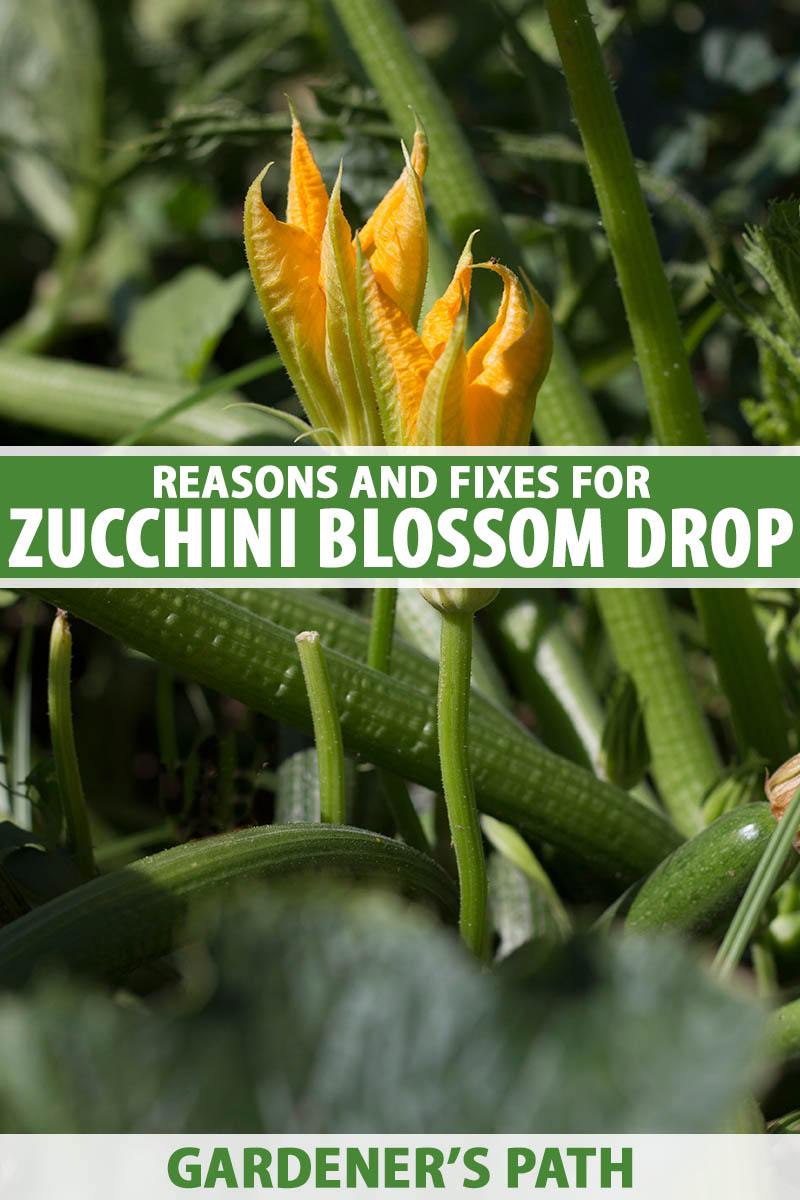
We link to vendors to help you find relevant products. If you buy from one of our links, we may earn a commission.
Why does this happen? I’ll suggest three possible explanations and give you pointers on how to cope with each.
Here’s what I’ll cover:
What You’ll Learn
3 Reasons Zucchini Blooms Drop
The sight of a bright blossom on your zucchini plant inspires such joy. Soon you’ll be picking an endless supply of green, gray, or golden fruits, right?
Uh-oh. What if you’re checking on their progress and note that instead of becoming delicious summer squash, the blossoms are lying on the ground near the plants?
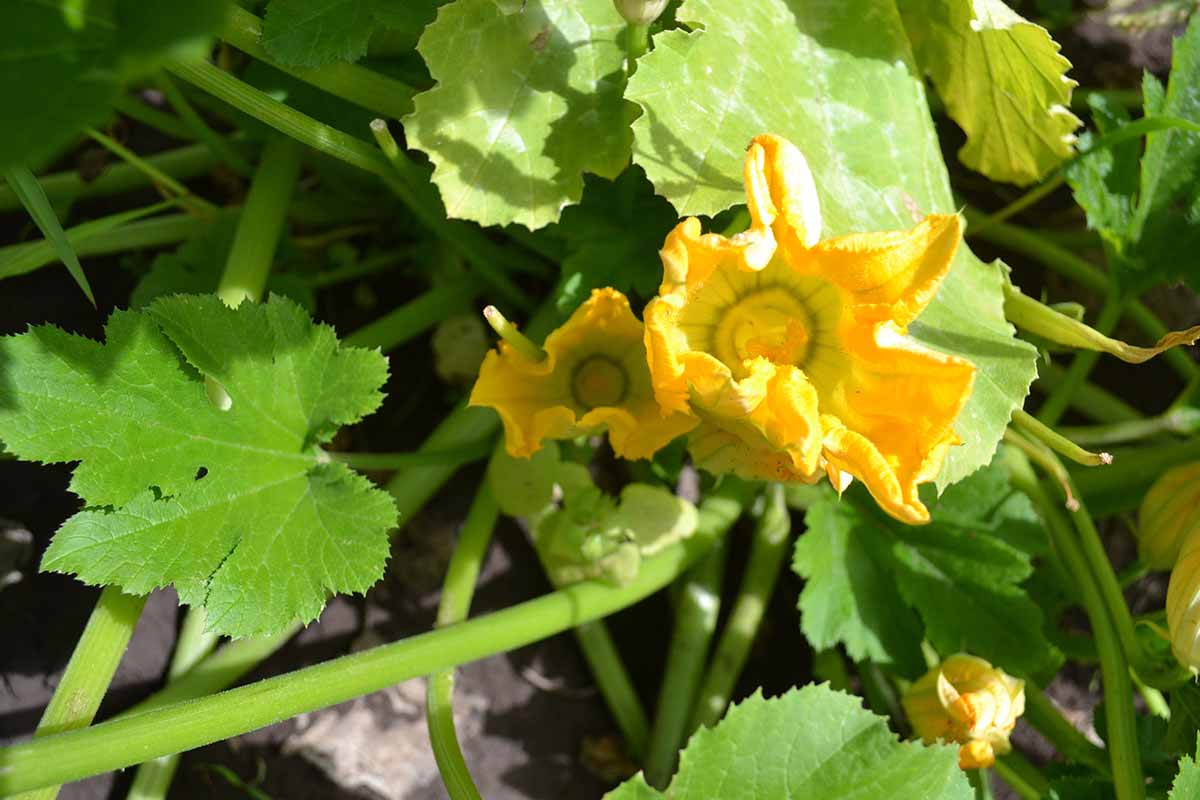
That’s disappointing, but it may turn out okay. There are three top reasons why zucchini plants drop their blossoms, and each has a couple of possible solutions.
Here’s what may be causing the flowers to fall off the plants:
1. They’re Male Flowers
As monoecious plants, each zucchini plant produces both male and female blossoms.
You can distinguish a male bloom because it forms atop a narrow stem, is more narrow at its base than the female flower, and doesn’t have a stigma in its center.
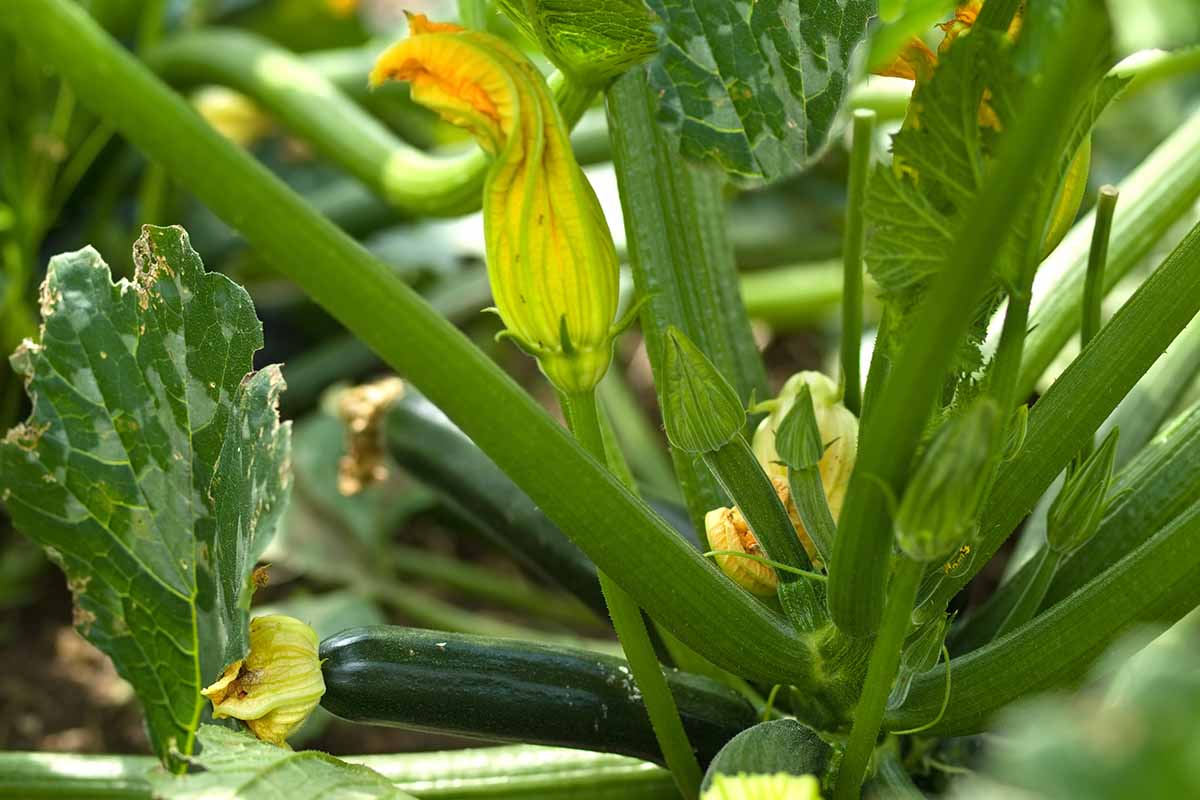
The males release pollen that bees and other pollinators convey to the stigma of the female flower.
After they’ve completed their duty, they fall off of the plant.
Note that if you catch them before they do drop, they’re edible blooms. And if you eat only male blossoms (leaving a few for pollination, of course) you don’t have to sacrifice a fruit the way you would if you pick and eat the female blossoms.
Like all varieties of summer squash, zucchini tend to produce a number of male flowers ahead of developing female flowers, sort of a test run. So even if you’ve lost a handful of blooms with no fruits in sight, your plants are probably fine.
If you’re losing flowers that do have a stigma in the center and grow on thicker bases, your zucchini probably has pollination issues. Read on for ways to detect and cope with that.
2. Poor Pollination
Poor pollination is by far the most common cause of female blossoms dropping without producing fruit.
Zucchini are pragmatic plants: If they sense pollination isn’t adequate for the flowers to produce mature fruits, they drop their blossoms and bloom again to give it another try when conditions are more favorable.
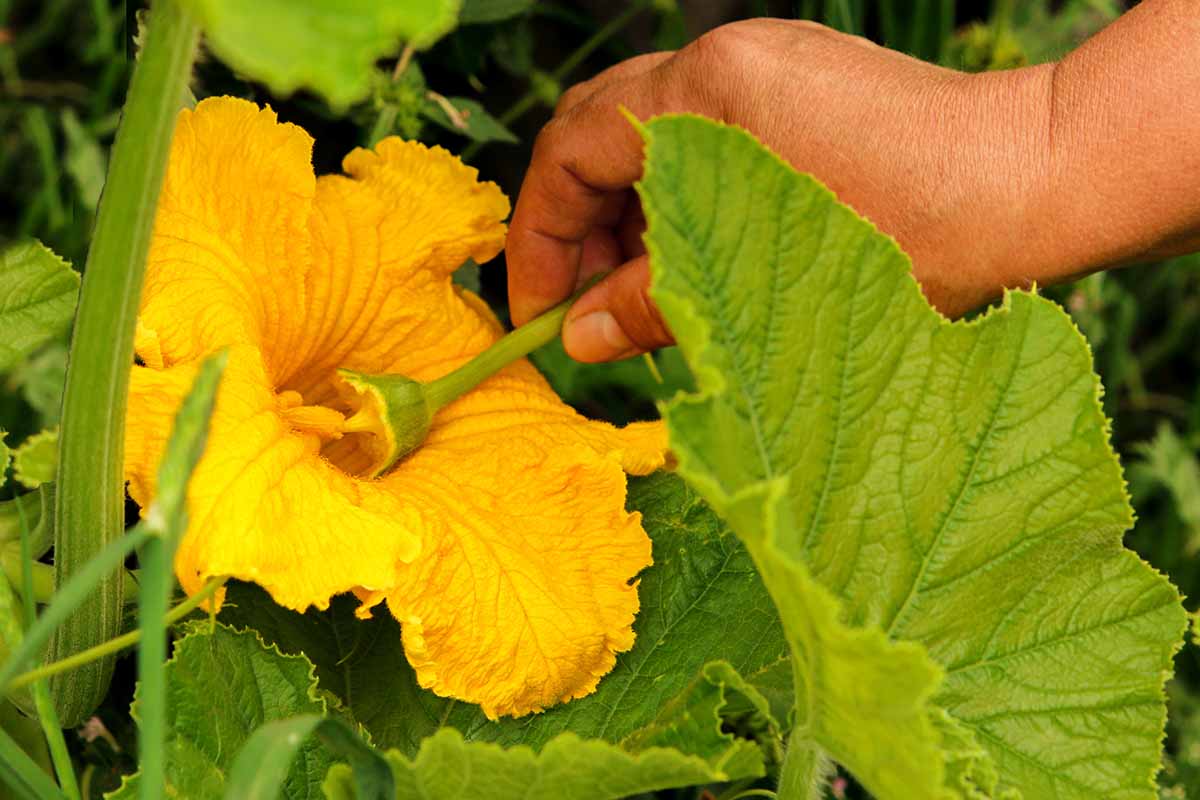
When you notice falling female flowers, you can play the waiting game.
If the plants do bloom anew, try your hand at manually pollinating the blossoms. All you’ll need is a small-tipped, clean watercolor paintbrush and patience.
Learn more about pollinating these summer squash plants by hand in our guide to troubleshooting problems with growing zucchini.
Also, remember that bees are more active in dry weather.
If the blossoms all jump ship after days or weeks of rain, the plants may just be reacting to a temporary lag in pollination. In this case, the situation may correct itself without assistance from you when the garden patch dries up.
I also have a few suggestions for encouraging pollinators, which I’ll offer right after we address the third potential cause of flowers that fall off.
3. Cutworms
While cutworms are the least likely explanation for flowers falling off, they may be the ones wreaking havoc nonetheless.
Adult miller moths won’t pose a threat to your harvest, but they do produce larvae known as cutworms that can chew right through the stems of your plants.
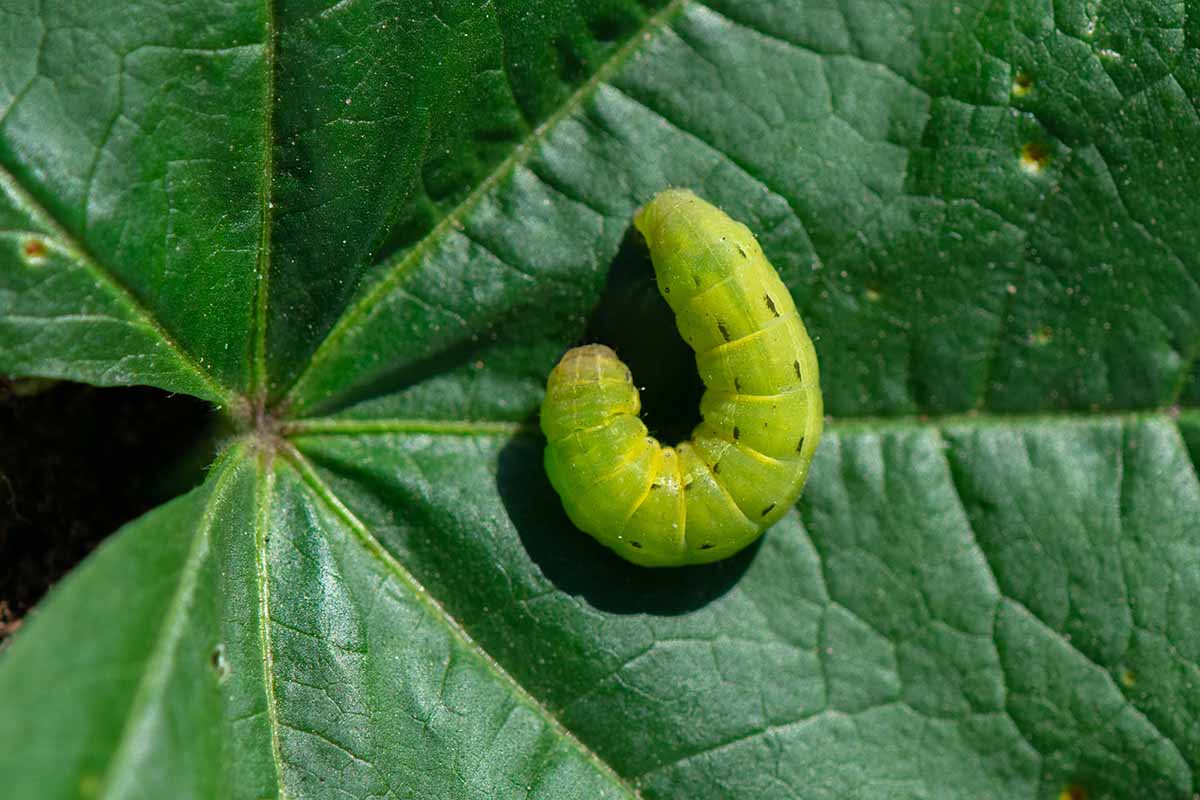
These plump caterpillars do their damage at night. They sever stalks, and may even target the ones with flowers growing on top.
Keep an eye on your young seedlings and note when they start flowering, so you’ll be able to tell if you’re losing just the blossoms or also the stems of the vines or bushes, which could indicate a cutworm infestation.
Learn more about detecting, preventing, and coping with cutworms and in our guide to zucchini pests.
Ways to Promote Pollination
Along with manually pollinating the flowers as needed, your plants will benefit when you encourage bees and other pollinators in your yard and vegetable patch.
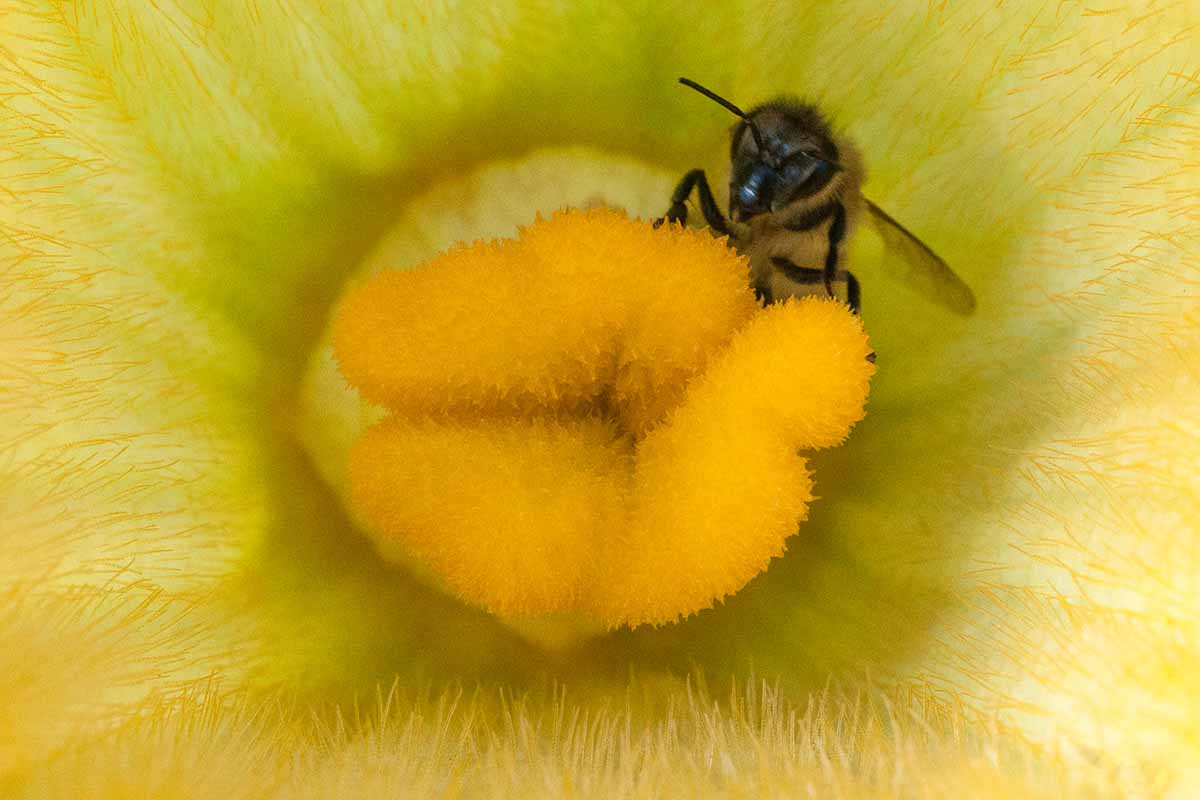
You can start by situating your vegetable garden only in an area where chemical pesticides have not been applied nearby. Broad-spectrum pesticides coating the grass or landscape ornamentals can kill all the pollinators in the vicinity.
Also take a look at the losses incurred when you or your neighbors habitually spray for mosquitoes. That type of spray can eliminate beneficial insects at the same time.
It might be time for a calm conversation if you observe nearby neighbors treating the adjacent property with chemicals.
If you can’t make headway there, consider switching to container gardening so you can locate your zucchini plants far from harmful pesticides.
And consider encouraging pollinators by providing winter homes for mason bees and planting native flowering plants that provide both pollen and nectar for honeybees.
You can further support the pollinator population by leaving a few flowering weeds or planting early blooming flowers for them in spring – a couple of dandelions, for example, or a border of bachelor’s buttons.
When they have a source of food beginning in early spring, pollinators are more likely to get established in your yard or close by. Then they’ll be ready to tote pollen from flower to flower in summer when your zucchini crop is depending on them.
You can learn more about how to attract pollinators to your garden in our guide.
While supporting pollinators in your vegetable garden is the most eco-friendly way to keep those blossoms on your zucchini, it’s also possible to minimize the issue by growing ‘Dunja,’ a cultivar bred to set fruit with minimal assistance from pollinators.

They’ll still need some pollination, but far less than other types. They also mature in a mere 47 days and are resistant to several common diseases, including powdery mildew.
You can find packets of ‘Dunja’ seeds available from David’s Garden Seeds via Amazon.
Stop the Blossom Drop
It makes me happy to promote bumper crops in my vegetable patch and simultaneously give the local ecosystem an assist. Encouraging pollinators in our yard is one vivid example of a win-win process.
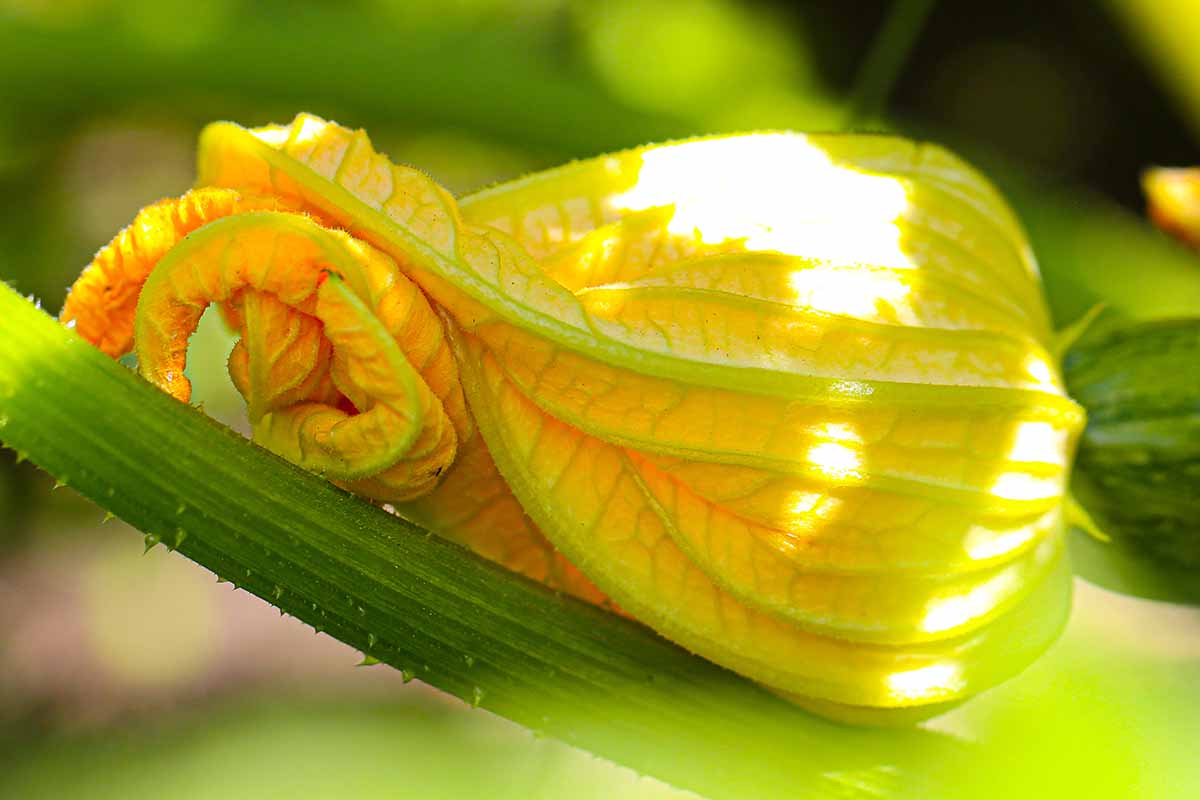
At our home, we provide a mason bee house so these pollinators can overwinter, let some of our bunching onions bloom each spring to draw pollinators, and are conscientious about never using treated mulch or lawn chemicals.
What about you? Do you have tips on discouraging blossom drop that we haven’t covered here, or more questions on the topic? The comments section below awaits your input.
And if you’d like more tips for growing and caring for zucchini, have a read of these guides next:



Thank you for pointing out the problems of mosquito spray companies. But I wish you’d be a little more direct. E.g. ‘Some mosquito control companies claim that their spray kills only mosquitos. We wish it were so, but a spray that kills mosquitos but not beneficial insects DOES NOT EXIST.” My next-door neighbors, intelligent, successful people, bought entirely into the “only mosquitoes” claim. I’m moving my pollinator plants away, and still asking them how many butterflies, bees, lightning bugs they see. They just hang their hat on what the spray company said. Sorry to get on my soapbox, but I’m… Read more »
Hello, Sarah. It sure is awful when any pesticide kills pollinators, and you are right to keep your precious open-pollinated vegetables far from areas treated with pesticides. Thanks for reading and sharing our view that pollinators need our protection and encouragement.